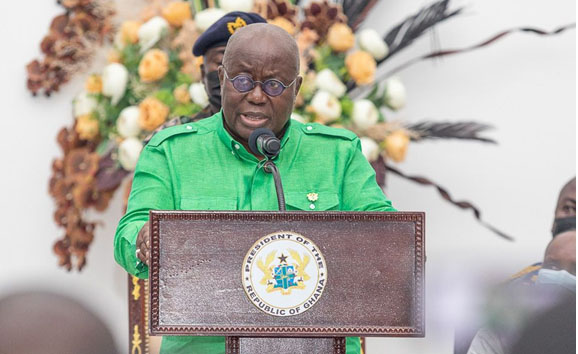President Akufo-Addo has joined the campaign to get the death penalty expunged from the country’s laws.
He believes that once Ghana has made a conscious effort not to invoke the death penalty on persons who are sentenced to death, the nation ought to “do the logical thing” by removing it completely from her statute books, something he said was long overdue.
This was when a delegation from Amnesty International (AI) paid a courtesy call on him at the Jubilee House Friday evening with an appeal to the President for the death penalty to be abolished.
President Akufo-Addo, however, raised issues with the applicability of abolishing the death penalty to persons who commit acts of terrorism.
He said it will be important to give consideration to how the abolition of the death penalty would apply to terrorists.
That, he said was because “a lot of people have come to me who in principle support the abolition of the death penalty but whenever the issue of terrorism is raised and the mindless manner in which some of these terrorist groups operate to destroy human life, operations which do not involve killing of one person, but involves the annihilation of villages, of communities, people hesitate about supporting the abolition of the death penalty for such actors.”
He therefore insisted “I think it is important that the education and sensitization is sufficiently well laid to address issues like that.”
“Nevertheless, I think that the principle is one that we should move towards in Ghana. In our case in Ghana, since we have made a conscious decision not to invoke the death penalty, then we should do the logical thing and remove it from our statute books”, he said.
For him, “it’s a different matter if we were using it selectively; we are not using it at all.”
Rather, he indicated that “everybody who is sentenced to death by the courts is automatically commuted to life imprisonment even though their treatment is still somewhat differentiated,”
On his part, Board Chairman of Amnesty International, Francis Nyantakyi, who led the delegation which included the Member of Parliament for Madina, Francis Xavier Sosu said Ghana can attain the abolition of the death penalty by amending the Armed Forces Act, 1960 (Act 105) and the Criminal and Other Offences Act, 1960 (Act 29).
The two Acts, according to him contain the provisions in Ghana’s statute books that support the application of the death penalty.
He however noted that some progress has been made since AI last raised the issue with President Akufo-Addo in February 2020.
“A private member bill has been introduced in Parliament by Francis Xavier Sosu, MP for Madina and ranking member of Parliament Select Committee on Legal, Constitutional and Parliamentary Affairs,” Nyantakyi said.
“With your [President Akufo-Addo] support, we hope that Ghana joins our neighbouring countries Benin, Burkina Faso, Ivory Coast, Togo and host of other African countries including Sierra Leone, and Liberia, that have abolished the death penalty,” he added.
Meanwhile, Ghana is yet to ratify the Second Optional Protocol to the International Covenant on Civil and Political Rights, a subsidiary agreement to the International Covenant on Civil and Political Rights, which is aimed at abolishing the death penalty.”
The Optional Protocol was created on 15 December 1989 and entered into force on 11 July 1991.
Amnesty International is a global movement of more than 10 million people who take injustice personally. Its aim is to campaign for a world where human rights are enjoyed by all.
AI is independent of any political ideology, economic interest or religion and they believe that no government is beyond scrutiny and no situation is beyond hope.
AI investigates and exposes the facts, whenever and wherever abuses happen. It also lobbies governments, and other powerful groups such as companies to make sure that they keep their promises and respect international law.
It is also AI’s aim to tell the powerful stories of the people they work with, mobilize millions of supporters around the world to campaign for change, and stand in defence of activists on the frontline while supporting people to claim their rights through education and training.
By Charles Takyi-Boadu, Presidential Correspondent


